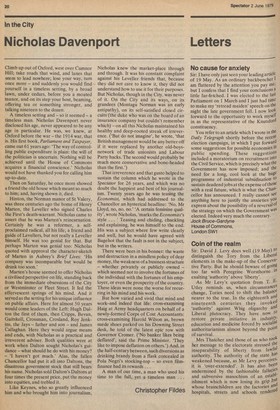In the City
Nicholas Davenport
Climb up out of Oxford, west over Cumnor Hill; take roads that wind, and lanes that seem to lead nowhere; lose your way, turn once more — and suddenly you would find yourself in a timeless setting, by a broad lawn, under cedars, before you a moated manor, and on its step your host, beaming, offering tea or something stronger, and talking nineteen to the dozen.
A timeless setting and — so it seemed — a timeless man. Nicholas Davenport never disclosed his age, never appeared to be any age in particular. He was, we knew, at Oxford before the war—the 1914 war, that is. His first book, Parliament and Taxpayer, came out 61 years ago: 'The way of controlling public expenditure is plain: the will of the politician is uncertain. Nothing will be achieved until the House of Commons acquires a financial conscience.' Nicholas would not have thanked you for calling him up-to-date.
Then on Saturday, he once more showed a friend the old house which meant so much to him; and, having shown it, died.
Hinton, the Norman manor of St Valery, was three centuries ago the home of Henry Marten, the Leveller who signed Charles the First's death-warrant. Nicholas came to assert that he was Marten's reincarnation. Certainly he was a reformer, a selfproclaimed radical, all his life; a friend and guide of Levellers, but not really a Leveller himself. He was too genial for that. But perhaps Marten was genial too: Nicholas quoted with approval the character-sketch of Marten in Aubrey's Brief Lives: 'His company was incomparable but would be drunk too soon.'
Marten's house seemed to offer Nicholas a civilised perspective on life, standing back from the immediate obsessions of the City or Westminster or Fleet Street. It fed the effervescent springs of his mind. And it served as the setting for his unique influence on public affairs. Here for almost 50 years would come leaders of the Left: Hugh Dalton the first of them, then Cripps, Bevan, Gaitskell, Crossman, Crosland, Roy Jenkins, the Jays — father and son — and James Callaghan. Here they would argue means and ends, with Nicholas as a practical and irreverent adviser. Both qualities were at work when Dalton sought Nicholas's guidance — what should he do with his money? — 'I haven't got much.' Alas, the fallen Chancellor had put it all into Daltons, the disastrous government stock that still bears his name. Nicholas sold Dalton's Daltons at four times the present price, put the money into equities, and trebled it.
Like Keynes, who so greatly influenced him and who brought him into journalism, Nicholas knew the market-place through and through. It was his constant complaint against his Leveller friends that, because they did not care to know it, they did not understand how to use it for their purposes. But Nicholas, though in the City, was never of it. On the City and its ways, on its grandees (Montagu Norman was an early antipathy), on its self-satisfied closed circuits (the duke who was on the board of an insurance company but couldn't remember which) —on all this Nicholas maintained his healthy and deep-rooted streak of irreverence. (Tut do not imagine', he wrote, 'that British management would be any better off if it were replaced by another old-boysnetwork of trade unionists and Labour Party hacks. The second would probably be much more conservative and bone-headed than the first') That irreverence and that gusto helped to sustain the column which he wrote in the Spectator for 26 years, and which was no doubt the happiest and best of his journalism. Twenty years ago he was teasing the Economist, which had addressed to the Chancellor an hysterical headline: 'No, Mr Lloyd, no, no, no.' A certain feminine quality', wrote Nicholas, 'marks the Economist's style .. . ' Teasing and chiding, chuckling and explaining, he was himself to the end. His was a subject where few write clearly and well, but he would have agreed with Bage hot that the fault is not in the subject, but in the writers.
There were bees in his bonnet: the waste and destruction in a mindless policy of dear money, the weakness of a business structure — whether privately or publicly owned — which seemed not to involve the fortunes of the individual with the fortunes of his employer, or even the prosperity of the country. These ideas were none the worse for recurring in his mind and his work.
But how varied and vivid that mind and work—and indeed that life: cross-examining Haig at Army headquarters on behalf of a newly-formed Corps of Cost Accountants: cross-examining Harold Wilson as, brown suede shoes parked on his Downing Street desk, he told of the latest epic row with Governor Cromer. Oslo banker likes being deflated', said the Prime Minister. 'They like to impose deflation on others.') And, in the half-century between, such diversions as drinking brandy from a flask concealed in Pola Negri's stocking-top — so even filmfinance had its rewards. . .
A man of our time, a man who used his time to the full, yet a timeless man . . .
Christopher Fildes






































 Previous page
Previous page